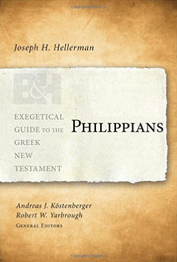“In the Form of God” (Phil 2:6)
Guest Joseph Hellerman (Ph.D., UCLA) is Professor of NT Language and Literature at Talbot School of Theology. His publications, both scholarly and practical, examine aspects of honor and shame in the New Testament. This post adapts portions of his latest book, an exegetical commentary on Philippians (B&H, 2015), and continues our series on “Honor Christology.”
What does Paul mean when he says Jesus was “in the form of God” (Phil 2:6)?  The NIV’s “in the very nature God” constitutes an interpretation that is not directly supported by the usage of the term. Although the term can be used substantially, there is no semantic component in morphe that necessitates a corresponding “nature” or ontology. Commentators who stress this theological corollary, however tend to underemphasize the sociological thrust of Paul’s argument. To rightly interpret the meaning of “in the form of God,” the occasion and context of Paul’s letter are instructive.
The NIV’s “in the very nature God” constitutes an interpretation that is not directly supported by the usage of the term. Although the term can be used substantially, there is no semantic component in morphe that necessitates a corresponding “nature” or ontology. Commentators who stress this theological corollary, however tend to underemphasize the sociological thrust of Paul’s argument. To rightly interpret the meaning of “in the form of God,” the occasion and context of Paul’s letter are instructive.
The Occasion of Philippians
Particularly illuminating for the interpretation of the letter is the location of the church in a highly Romanized sociopolitical environment. Philippi was an imperial colony, founded by Octavian and Antony in 42 BC. Archeological finds from the site reveal a socially stratified population obsessed with status markers such as Roman citizenship, public office, and prestigious titles (see my Reconstructing Honor, 64-109). Persons of every class competed with their peers for these coveted titles and offices, which the victors then displayed in “resume form” on inscriptions erected throughout the colony (cf. Phil 2:5-11 and 3:1-11).
Paul strongly resisted the “race to honors” (Latin, cursus honorum) that marked social life in Philippi. The apostle recognized that a stridently Roman honor culture had the potential to seriously undermine the radically different relational ethos that Jesus intended for his community of followers. And so Paul confronts Roman social priorities throughout the letter, preeminently in the epistle’s magnificent centerpiece, Philippians 2:5-11. In his portrayal of the humiliation and exaltation of Christ, Paul turns the race of honors on its head, forcefully challenging anyone—then or now—who would utilize his power, authority, or social capital in the service of his own personal agenda.
The meaning of “in the form of God”
The great majority of instances where the Greek word morphe and its cognates occur, the word group simply denotes “outward appearance.” How are we to understand Paul’s reference to Christ “being in the outward appearance of God”? The most persuasive takes into consideration the following:
- A pronounced preoccupation with honor and status in Roman Philippi.
- The importance of clothing as a public mark of social status in the Roman world.
- The association between glory, clothing, and outward appearance in biblical literature (cf., Lk 9:28-32; 12:27)
- A similar grammatical construction in Luke 7:25, where royal clothing is in view.
- The meaning of Phil 2:6-7.
“In the form of God” most likely presents a picture of the preexistent Christ clothed in the garments of divine majesty and splendor. Paul draws attention to Christ’s preincarnate social status, publically marked out by clothing appropriate to his divine rank. The image was particularly fitting in a letter intended for a group of Christians in status-conscious Philippi. That is not to say the argument for the deity of Christ cannot be made, secondarily, from the phrase. Here, Paul focuses on Christ’s outward appearance and its implications for rank and status (a theme ignored in most treatments of the phrase), not upon Christ’s inner or essential nature. The following phrases, “equality with God,” “emptied himself,” and “form of a slave,” further support this reading of “in the form of God” as a signifier of social status.

I enjoyed this explanation of Phil 2 illumined by honour & shame. One question for Prof. Hellerman: we tend to think of the phrase “emptied himself” as most naturally referring something internal, not an externally focused phrase (as clothing is). So would we think of him ’emptying himself’ as emptying of the honour & perceived value that goes with exchanging kingly clothes for those of a slave (honour & perceived value having both an external and internal elements and could still be said to include power)?
The article was splendid,though too short. I sometimes talk about a revival or baptism of humility as per the Phil 2:3-5 ethic – so counter to human nature, and especially in societies where gaining and maintaining honor is a core value. Hellerman has and inspired me further in this thinking. This, indeed, can revolutionize the emerging church movements in many parts of the world.
Phenomenal. This reading of “morphe” in this context makes so much more sense than the ontological view I have felt forced into for decades (by virtue of never having heard any plausible alternative). Thank you.